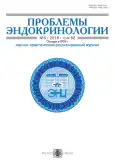Activity of nucleolar organizers in endometrial glandular and surface epithelial cells in patients with external genital endometriosis
- Authors: Kurenkov E.L.1, Igenbaeva E.V.1, Uzlova T.V.1
-
Affiliations:
- South-Urals State Medical University
- Issue: Vol 67, No 6 (2018)
- Pages: 45-49
- Section: Articles
- URL: https://bakhtiniada.ru/jowd/article/view/10969
- DOI: https://doi.org/10.17816/JOWD67645-49
- ID: 10969
Cite item
Full Text
Abstract
Hypothesis/aims of study. Endometriosis is a disease characterized by proliferation of tissue that is similar in morphology and function to the endometrium, outside the uterine cavity. Thanks to the theory of J. Sampson (1927), which explains endometrioid heterotopia formation by bits of endometrial tissue migrating through the fallopian tubes during menstruation and their subsequent implantation in the pelvis, research has begun on the biological properties of eutopic endometrial cells in women with endometriosis, which is still relevant today. The present study was aimed to assess the activity of nucleolus organizers in the endometrium in women with external genital endometriosis and without it at different stages of the menstrual cycle.
Study design, materials, and methods. Paraffin blocks of endometrial biopsy specimens were taken from 68 women with and without external genital endometriosis. The activity of nucleolar organizers was evaluated by the method of J. Crocker (1983).
Results. The data obtained showed a significant increase in ribosomal activity in the cells of the endometrial glandular and surface epithelium in women with external genital endometriosis at the stages of late proliferation, as well as early and middle secretions. There was also a significant decrease in the activity of the nucleolar organizers of endometrial epithelial cells at the stage of late secretion in women with external genital endometriosis.
Conclusion. The obtained differences in regulation of ribosomal synthesis in the cells of the integument and glandular epithelium of the endometrium in women with external genital endometriosis, in our opinion, can provide an increase in the total amount of epitheliocytes of the endometrium, increase their adhesive and invasive abilities, and lengthen the life cycle of cells. This contributes to the formation of endometrioid heterotopies and the development of external genital endometriosis. Changes in the activity of nucleolar organizers in the endometrium in women with external genital endometriosis may be of clinical interest for the diagnosis of this pathology.
Keywords
Full Text
##article.viewOnOriginalSite##About the authors
Evgeny L. Kurenkov
South-Urals State Medical University
Author for correspondence.
Email: kurenkovel@chelsma.ru
MD, PhD, DSci (Medicine), Professor, the Head of the Department of Human Anatomy
Russian Federation, ChelyabinskElena V. Igenbaeva
South-Urals State Medical University
Email: bulba2606@mail.ru
MD. The Gynecological Department, the Clinic
Russian Federation, ChelyabinskTatyana V. Uzlova
South-Urals State Medical University
Email: tatiana.uzlova@mail.ru
MD, PhD, DSci (Medicine), Professor. The Department of Obstetrics and Gynecology
Russian Federation, ChelyabinskReferences
- Дамиров М.М., Олейникова О.Н., Майорова О.В. Генитальный эндометриоз. Взгляд практикующего врача. - М.: БИНОМ, 2013. [Damirov MM, Oleynikova ON, Mayorova OV. Genital’nyy endometrioz. Vzglyad praktikuyushchego vracha. Moscow: BINOM; 2013. (In Russ.)]
- Collette T, Maheux R, Mailloux J, Akoum A. Increased expression of matrix metalloproteinase-9 in the eutopic endometrial tissue of women with endometriosis. Hum Reprod. 2006;21(12):3059-3067. doi: 10.1093/humrep/del297.
- Dmowski WP, Ding J, Shen J, et al. Apoptosis in endometrial glandular and stromal cells in women with and without endometriosis. Human Reproduction. 2001;16(9):1802-1808. doi: 10.1093/humrep/16.9.1802.
- Крокер Д. Районы ядрышкового организатора и фибриллярные центры // Молекулярная клиническая диагностика. Методы / Под ред. С. Херрингтона, Дж. Макги. - М.: Мир, 1999. - С. 261-279. [Kroker D. Rayony yadryshkovogo organizatora i fibrillyarnye tsentry. In: Diagnostic molecular pathology a practical approach. Ed by S. Herrington, J. McGee. Moscow: Mir; 1999. P. 261-279. (In Russ.)]
- Burlev VA, Pavlovich SV, Il’yasova NA. Apoptosis and proliferative activity in endometrium during peritoneal endometriosis. Bull Exp Biol Med. 2006;141(2):204-207. doi: 10.1007/s10517-006-0128-x.
- Matsuzaki S, Maleysson E, Darcha C. Analysis of matrix metalloproteinase-7 expression in eutopic and ectopic endometrium samples from patients with different forms of endometriosis. Hum Reprod. 2010;25(3):742-750. doi: 10.1093/humrep/dep435.
- Evans-Hoeker E, Lessey BA, Jeong JW, et al. Endometrial BCL6 Overexpression in Eutopic Endometrium of Women with Endometriosis. Reprod Sci. 2016;23(9):1234-1241. doi: 10.1177/1933719116649711.
- Szymanowski K, Mikolajczyk M, Wirstlein P, Dera-Szymanowska A. Matrix metalloproteinase-2 (MMP-2), MMP-9, tissue inhibitor of matrix metalloproteinases (TIMP-1) and transforming growth factor-beta2 (TGF-beta2) expression in eutopic endometrium of women with peritoneal endometriosis. Ann Agric Environ Med. 2016;23(4):649-653. doi: 10.5604/12321966.1226861.
- Braun DP, Ding J, Shaheen F, et al. Quantitative expression of apoptosis-regulating genes in endometrium from women with and without endometriosis. Fertil Steril. 2007;87(2):263-268. doi: 10.1016/j.fertnstert.2006.06.026.
- Zubor P, Hatok J, Galo S, et al. Anti-apoptotic and pro-apoptotic gene expression evaluated from eutopic endometrium in the proliferative phase of the menstrual cycle among women with endometriosis and healthy controls. Eur J Obstet Gynecol Reprod Biol. 2009;145(2):172-176. doi: 10.1016/j.ejogrb.2009.04.024.
- Park JS, Lee JH, Kim M, et al. Endometrium from women with endometriosis shows increased proliferation activity. Fertil Steril. 2009;92(4):1246-1249. doi: 10.1016/j.fertnstert.2009.04.025.
Supplementary files







